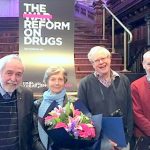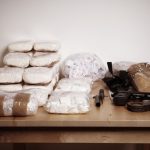Preaching “Just Say No” Endangers Lives: Informed Decision-Making Protects Them

We live in a state where the head of government continues to spout rhetoric about drug use in line with former US first lady Nancy Reagan. The “just say no” to drugs approach remains as simple and ineffective as it was back in the 1980s, when the late Ms Reagan was pushing it.
“Just say no”, or as Ms Berejiklian termed it a fortnight ago “don’t take illegal substances”, doesn’t take into consideration that most people taking illicit drugs get away with it. At worst, those who do consume them suffer something similar to a hangover.
The warm weather will soon be upon us and with it will come music festivals. In mid-September last year, two young Australians attending Defqon.1 died in drug-related circumstances, because they weren’t aware of what they were taking.
The public, yet again, called for pill testing. But, the NSW premier refused to contemplate this option that’s saved countless lives elsewhere in the world. Instead, she channelled Reagan and by the end of the festival season, the number of deaths had risen to five.
And as MDMA pills grow stronger on the unchecked black market, and double-dropping seems like a good option to youths, who have to run the gauntlet of uniformed officers with dogs out the front of events, it might be the case that more deaths are just around the corner.
Benign in the light/Lethal in the dark
MDMA is the main drug that festivalgoers take. Although, they have no way of gauging whether any pills they buy are actually MDMA or if they’re a correct dosage or whether the contents contain any other more dangerous substances.
As Australian Drug Law Reform Foundation president Dr Alex Wodak has pointed out on numerous occasions, MDMA is one of the “least risky drugs”. But, as he explained to Sydney Criminal Lawyers a few weeks back, “like other drugs”, the toxicity of MDMA “is greater with higher doses”.
The use of MDMA as a party drug took off in Sydney in the 1990s. Back then, it was more commonly known as ecstasy. And for many it provided a welcome accompaniment to electronic music, as well as an alternative to the violence associated with alcohol.
MDMA was first synthesised by German pharmaceutical company Merck in 1912, which was the same year that the first transnational drug control treaty – the International Opium Convention – started the global community down the path of prohibition.
The pretext of the common good
The US-led system of drug prohibition was ostensibly geared towards preventing people from taking certain drugs, although from the very start, those who continued to distribute these outlawed and highly desired substances benefited from the steep rise in prices.
And by 1971, not only did US president Nixon want to continue the ban on certain drugs, but he wanted to crack down on the political left and the African American community, so he launched the war on drugs, which led to actual combat-like violence on the streets and in the field.
As HEMP Embassy president Michael Balderstone explained in May, the drug war “has just gotten out of control”. He added that “what might have started off as a little scam to try and control pain relief – and the profits to be made – has turned into a global nightmare”.
Around a century of drug prohibition has led to the harms associated with their outlaw being greater than those caused by the substances themselves. Prohibition-related harms include huge criminal networks, the criminalisation of people for using and the uncertainty of what’s being peddled.
It’s just not cricket
The issue the NSW premier isn’t brave enough to look at is that her young constituents are dying unnecessary deaths either because they don’t know what they’re taking or they’re taking too much to try and avoid the NSW police.
Pill testing is a harm reduction approach that has been utilised in Europe since the early 1990s. It provides people with an understanding of what their drugs contain, so they can then make an informed decision about not taking them if it seems likely they could be harmful.
This intervention is all about combating the harms caused by prohibition. If MDMA wasn’t prohibited, it could be sold in clean, safe dosages. People, of course, could still take too many and die, just as they can by taking too much paracetamol or drinking too much alcohol.
Further, if pill testing services were provided at festivals, the police wouldn’t have to be so heavy-handed with the dogs and strip searches, which have been shown to lead to young people swallowing too many drugs at once so as to avoid getting in trouble, only to die as a consequence.
But, NSW authorities aren’t as sophisticated as their European counterparts. In this state, politicians prefer a “serves you right” approach to young people dying from the same drugs thousands of others are taking. And they’re also happy to let officers packing guns order youths to strip off.
That’s a high horse you’re on
Former Australian Federal Police Commissioner Mick Palmer spends a great deal of time these days calling for pill testing. He explained last November that the intervention gives an opportunity to improve the awareness of the risks involved in doing what young people at festivals intend to do.
Indeed, these youths intend on doing just what people have done since the beginning: take psychoactive substances. And a century of prohibiting the majority of them, along with five decades of waging war on drugs, has just made these substances far more enticing and profitable.
Prominent UK barrister Chris Daw QC said in early July that it’s time “to stop talking about chemical substances as if they are inherently amoral”. After 26 years in the legal profession, he now advocates for the legalisation and regulation of all drugs.
If pharmaceutical grade MDMA was available on the market, it’s quite likely that no young festivalgoers would die in the coming months. And if that’s not available, a similar result could be obtained by allowing young people about to take drugs to check if they might prove lethal.
Perhaps those conservative NSW politicians should consider these options before they find themselves again standing at the bar, sinking a few glasses of the main licit substance, wondering what’s the best line to cook up for the press following the next drug-related festival death.







